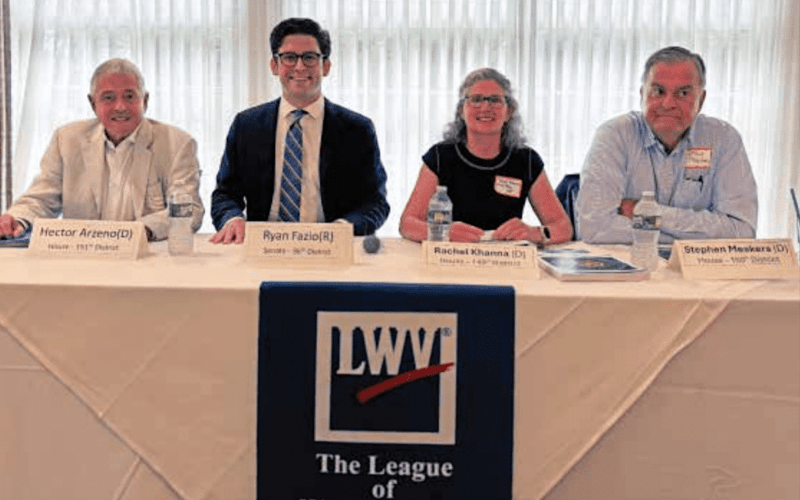In a well-attended town hall forum hosted by the League of Women Voters on Wednesday, state legislators engaged with the community to discuss their roles, recent achievements, and upcoming challenges. The panel included State Representatives Steve Meskers, Rachel Khanna, Hector Arzeno, and State Senator Ryan Fazio, each bringing their unique perspectives to a comprehensive discussion about the legislative progress and hurdles in Connecticut.
The forum kicked off with State Rep. Steve Meskers highlighting his tenure and his work across various committees. “I’ve been your state rep for six years,”Meskers began, “I sit on the insurance and real estate, which is a troublesome committee in that it’s very difficult to deal with healthcare costs.” He shared his initial optimism about tackling healthcare costs quickly, which was tempered by federal regulatory complexities. Meskers also noted his roles on the energy and technology committee and his recent efforts to become the chair of the commerce committee. “My sole and poignant focus is economic growth for the state,” he explained, emphasizing the need to balance economic growth and social services demand across the state.
State Rep. Rachel Khanna introduced herself next, mentioning her representation of the 149th District and her committee involvements. “I serve on the Appropriations, Transportation, and Government Administration and Elections Committee,” Khanna detailed, highlighting the breadth of her legislative focus which spans budgeting, transportation, and governance.
State Senator Ryan Fazio introduced his legislative role and areas of influence. “I’m in my third year in the state senate,” Fazio stated. “I am the ranking member of the Energy and Technology Committee, and the Planning and Development Committee, which deals with local government planning and zoning.” He also mentioned his membership on the Finance, Revenue and Bonding Committee and the Transportation Committee, underscoring his involvement in significant areas affecting state policy and infrastructure. State Rep. Hector Arzeno focused on his dedication to serving the 151st district and his committee assignments. “I serve in three committees: education, higher education and employment, and environment,” Arzeno said, noting the significance of these roles in addressing pressing state issues such as education reform and environmental challenges.
The moderator then shifted the discussion to the legislators’ accomplishments in the past session. Khanna took pride in several legislative successes. “We first of all voted for and passed the largest income tax cut in Connecticut’s history. We further protected women’s reproductive rights, we supported stronger gun safety legislation, and we got early voting passed,” she listed, showcasing a commitment to a broad array of policy improvements.
Senator Fazio highlighted bipartisan achievements and his focus on restoring local control over planning and zoning decisions. “I was very proud to author and pass Senate Bill 333 into law, which the governor signed,” Fazio shared. He explained that the law was a corrective measure against previous overreaching state mandates, allowing towns and cities to regain their local decision-making powers.
As the discussion continued, Arzeno underscored the legislative efforts in education and environmental sectors. “In the prior session of 2023, we passed 260 million in budget for the public school system in Connecticut,” he stated, adding that they maintained funding in the current session and passed laws easing state mandates on school districts.
In addressing gun safety, a critical issue for Connecticut, Fazio expressed his concerns and outlined his approach to law enforcement. “I think our state needs strong gun safety laws and effective enforcement of those gun safety laws to keep people safe,” he asserted, highlighting the need for robust enforcement to complement the legal frameworks in place.
Specifically on gun control Khanna said, “I think we’re very fortunate here in Connecticut. We have very strong gun laws and gun violence prevention laws. We recently got an A from the Giffords Law Center on the strength of our gun violence prevention laws. And in 2023 we passed a big bill, I’m going to go very fast, on further strengthening our gun violence prevention laws. The bill restricted open carry, banned ghost guns and closed some of the existing loopholes around those guns. Limited handgun purchases to three in 30 days, had safe provisions on safe storage and trigger locks, expanded our assault weapon ban, and had penalties for failing to report lost or stolen guns. So I think we’re doing well. There’s more that we can do, and I think we just need to keep making progress as best as we can.”
State Rep. Steve Meskers highlighted his commitment to vulnerable populations within his district. “Thematically, one of the concerns for our delegation and one of our focuses has been on our vulnerable residents, our youth and our seniors,” Meskers stated. He elaborated on his efforts to secure funding for critical community facilities, such as the Parsonage Cottage. “We also got money for the roof at the Parsonage Cottage, which is part of our assisted living facilities and part of our housing authority in Greenwich communities,” he added.
Discussing economic issues, Meskers noted his role in enhancing the state’s economic framework, particularly through his position on the commerce committee. “My focus after fighting aggressively to get to be the chair of commerce has been to right the ship or grow the commercial aspects of the state,” Meskers said.
State Senator Ryan Fazio addressed fiscal concerns, particularly highlighting the risks associated with current financial strategies. “I was a little concerned at the end of session that we were basically bumping up or threatening to cheat against our fiscal guardrails,” Fazio expressed, referring to budgetary practices that could potentially undermine the state’s fiscal health. He stressed the importance of maintaining discipline in financial governance, especially given the increased state debt issuance. “The bonding package increased the total debt issuance in the state annually by $350 million,” he noted, illustrating the scale of financial decisions being made.
Fazio also spoke on healthcare, expressing disappointment over the stagnation in healthcare reform and highlighting bipartisan proposals that could offer solutions. “There was a great bipartisan proposal, the association healthcare plans, which would allow businesses to pull their resources, arbitrage a little bit around some of the healthcare regulations,” he said. Fazio emphasized the need for continued efforts to find bipartisan solutions to healthcare challenges, advocating for policies that could reduce costs and improve access.
Arzeno discussed his focus on environmental issues, underlining the legislative success in passing bills aimed at preserving Connecticut’s natural landscapes and addressing climate change. Arzeno highlighted the importance of balancing development with conservation efforts across the state.
Fazio emphasized his concerns over eroding local a control saying, “I think we need to fight tooth and nail to protect local control of our towns and cities, especially over decision-making related to zoning and development. And it’s very much at risk in the years to come.”
“Currently,” he continued, “there is a task force related to fair share that you remember was passed in its 1.0 form, in its initial form, which is basically 8-30g on steroids. It stands the chance of doubling our mandate as towns or cities in the years to come if it’s passed in full.”
“So we have to be fighting harder than ever before in the years to come,” Fazio explained. “It’s bad enough now, but you’re going to think that 8-30g is a walk in the park if fair share passes in the years to come. So we’re going to have to fight like hell in the next two years.”
As the forum neared its conclusion, a question from the audience member, Louisa Green, shifted the focus to engaging younger demographics in the political process. She asked Fazio for insights on increasing young voter participation. “GenZ is more so than millennials, disaffiliating with parties. They’re fed up with politics in this country because it’s gotten so ugly, and who can blame them?” Fazio responded. He emphasized the potential for local politics to engage young voters more positively and constructively, suggesting that involvement at the local level could be more appealing and impactful.





